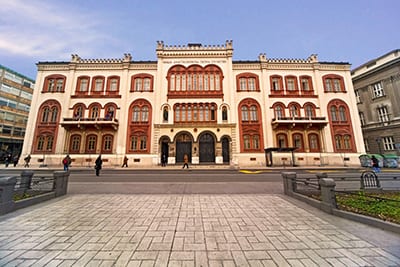Despite the modest conditions under which it operates, the University of Belgrade’s inclusion on the list of the world’s top 500 universities is an incredible success. Now that Serbia has become a programme country within the Erasmus programme, new opportunities to improve the quality of higher education are arising
The universal acceptance of our diplomas and successful careers of our graduates worldwide prove that our educational programmes are good. With a little flexibility, i.e. adaptation to the needs of the labour market, they could be even better, says Ivanka Popović PhD, Rector of the University of Belgrade.
The higher education system is changing rapidly around the world? Are we succeeding in keeping pace with that change? What kind of educational programmes do we need?
– Higher education is indeed changing rapidly and adapting to the needs of contemporary society and today’s labour market. At a time when clear boundaries between disciplines are disappearing, great efforts are being exerted to develop multidisciplinary, trans-disciplinary and interdisciplinary study programmes. They are being established more slowly in our country, because our traditionally established working environment doesn’t recognise such vocations, especially in codified work positions, which creates serious problems when it comes to workers with such qualifications securing employment.
Our educational programmes are otherwise good, as proven by the universal acceptance of our diplomas and the successful careers of our graduates worldwide. They would be even better if they were slightly more flexible, or more adapted to the needs of the labour market.
The introduction of advisory councils of employers at universities and colleges can improve communication and cooperation between higher education institutions and employers
Greater transparency in the work of the University of Belgrade, a review of the Bologna Process and increasing numbers of foreign students are among your plans. Have you already launched their implementation?
– Yes. Greater transparency in the work of the University of Belgrade ensures better visibility of the activities conducted at the University, with which trust is established in the University as an institution of national importance.

Universities in Serbia are entering a new cycle of accreditation, so analysis of the results to date of study programmes harmonised with the Bologna principles is invaluable. Evaluating and reviewing those results will highlight possible improvements that can be implemented in the upcoming accreditation cycle.
In cooperation with the Ministry of Education, Science and Technological Development, we are working to improve conditions for the arrival and residence of foreign students in Serbia.
We need to exert significant efforts in order to open up our education system to foreign citizens.
Is it possible to reach agreement among the members of the University of Belgrade regarding the long-term development strategy?
– It is certainly possible. And this is especially so in relation to strategies for nurturing high-quality personnel and securing adequate infrastructure in terms of space and equipment.
Universities in Serbia are entering a new cycle of accreditation. Analysis of the results to date of study programmes harmonised with the Bologna principles will indicate possible improvements
You’ve stated that it will not be possible to implement the new reform of the University without serious financial support. Do you expect it to be forthcoming?
– The University community in Serbia implemented the Bologna principles without financial support, which had a significant impact on the modest effects of reforms. The level of national budget funding allocated for education in the period ahead will show the extent to which we, as a country, really intend to realise improvements.
The University of Belgrade has fallen below a ranking of 300th on the Shanghai list. Is that a cause of concern?
 – Considering the modest conditions under which the University of Belgrade operates, the very presence of the University on the list of the world’s top 500 universities is an incredible success. I think this fact is insufficiently understood and appreciated.
– Considering the modest conditions under which the University of Belgrade operates, the very presence of the University on the list of the world’s top 500 universities is an incredible success. I think this fact is insufficiently understood and appreciated.
A position on the top half of that list depends primarily on the presence of top scientists in the institution, such as Nobel Laureates or highly-cited scientists. We don’t have enough such personnel and can expect to drop further on that list in the coming period.
Will the state develop a plan for staffing needs, to ensure that we don’t educate young people for surplus occupations or experts for the developed and rich countries of Europe and the world?
– The government has, in recent years, increased the number of budgeted places for professions that are in demand or in short supply, which indicates that it is monitoring the trends of human resources.
A total of 14.7 billion euros has been earmarked for the Erasmus+ programme for the period from 2014 to 2020. How much has this programme contributed to increasing the quality of higher education in Serbia?
– The Erasmus+ programme has provided significant support to higher education in Serbia and has done so in several ways. Through various Erasmus+ programmes, structural changes have been implemented related to the improvement of higher education activities, numerous new study programmes have been introduced and a significant number of mobility factors have been provided for students, lecturers and non-teaching staff at higher education institutions.
Now that Serbia has become a programme country within the Erasmus+ programme, I expect new opportunities to improve the quality of higher education in our country to be created.